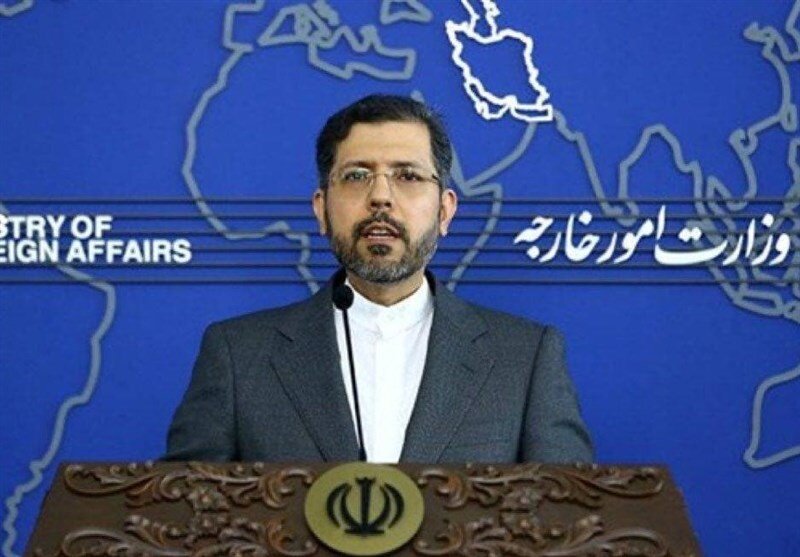Foreign Ministry hopes Taliban would not misuse Iran’s patience

TEHRAN — In his weekly press briefing on Monday, Iranian Foreign Ministry spokesman expressed hope that the interim Taliban governing body won’t misuse Iran’s patience and goodwill.
Responding to a question about the recent border clashes between Iranian and Afghan border guards, Saeed Khatibzadeh said, “Our brave border guards on our border with Afghanistan have dealt with restraint to this day due to the internal situation in Afghanistan and the possible unfamiliarity of some of the border guards stationed by the interim Afghan governing body on the border. Of course, this issue and its repetition is a matter of concern.”
He then added that Iran’s border guards have a responsibility and it is their duty to prevent any illegal trespassing.
“We were prepared to give the necessary training to the Afghan border guards on demarcate border and so on,” he suggested.
The spokesman reiterated that the recurrence of these issues is a matter of very serious concern to Tehran.
“We have informed the interim governing body of Afghanistan in various ways, and we hope that this restraint would not lead to the misunderstanding and misuse of the other side.”
An informed source in Herat had reported that there had been tension on Saturday at the border between Iranian border guards and the Taliban forces at the Dogharoon border crossing. The source explained that the Taliban forces initiated the construction of a road in the Dogharoon border area without prior coordination, which is considered a violation of the borders, and the Iranian border guards confronted the effort.
However, the Taliban forces resisted this measure, and after heated debates, both sides went on alert.
In a call with the Taliban’s Ministry of Interior and Defense, Hassan Kazemi Qomi, Iran’s Special Envoy to Afghanistan, has stressed that any moves at the joint borders without coordination should be stopped and that matters should be settled within the framework of the Supreme Border Committee and the updating of documents between the two countries.
Iran tries to resolve all disputes through other parties’ consent
Responding to a question about Iran-Afghanistan water rights agreement, the spokesman said the water right is an agreement between Iran and Afghanistan that has existed for many years, and Iran as a reasonable and stable government in the region tries to resolve all issues and disputes through the consent of the parties and through dialogue and diplomatic means.
“With the governing body of Afghanistan, we have raised this issue many times. The high-water commissioners have met and some inadequate action has been taken by the interim governing body of Afghanistan. We hope that the continuation of the path will lead to a decisive constructive action,” Khatibzadeh said.
Afghanistan has always been Iran’s priority
According to the Foreign Ministry spokesman, the situation in Afghanistan, has been important to Iran since day one, with a particular focus on involving all ethnic and religious groups in running the Central Asian country.
“Afghanistan’s responsibility to all ethnic groups has been reminded. We do not have a minority in Afghanistan, we have tribes in Afghanistan. Let me remind you of the definite responsibility of the interim body of Afghanistan to ensure the security of all ethnic groups in the country. The interim governing body has not yet been able to establish security in some areas,” he stressed.
'Unrecognized government cannot take over the embassy'
Khatibzadeh also told reporters that Iran will not hand over the embassy to the Taliban administration unless Tehran recognizes them.
“We will not hand over the embassy to any government that we have not recognized, and this is Iran's decision.”
He added that Afghan diplomats travel to their embassies, including Iran. There is no order to prevent the coming and going of diplomats, he said, adding the recognition path is another path that must be followed.
“The coming and going of diplomats between their capital and the embassies is normal and takes place in periods of three, four and five years, depending on the decision of the sending countries. This issue is enshrined in international conventions and is not new and has nothing to do with us recognizing the Taliban or other issues,” Khatibzadeh reiterated.
He then stated that the Afghan embassy in Tehran is accepting several thousand visitors and needs a large number of staff, especially in the consular section, adding, “We must help the embassy not to stop working after the end of its staff’s mission.”
